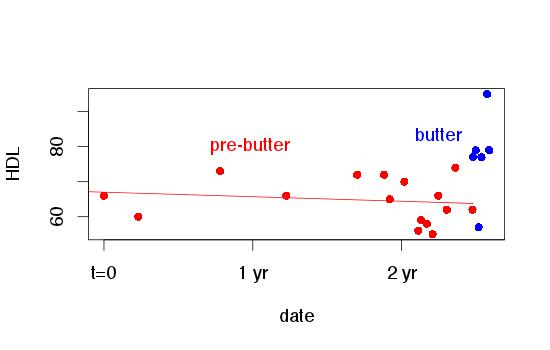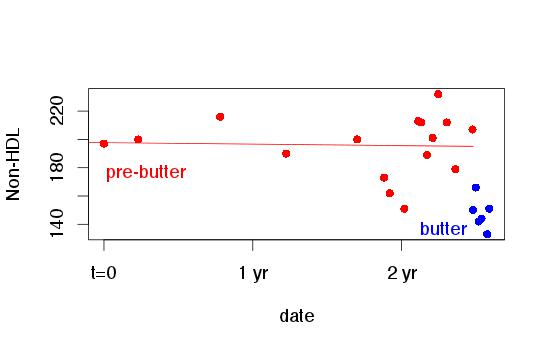More: Greg used Kerrygold butter in the results given below. I now see that he omitted data from other butters that did not agree with his conclusions. This makes his results considerably more doubtful and his whole post (in which Kerrygold butter is called “butter”) misleading. I have changed the title of this post to reflect this.
A New York lawyer named Greg reports remarkably clear evidence about the effect of butter on blood lipid levels: It improved them. For a few years he measured his HDL and LDL regularly with a home cholesterol device. For unrelated reasons, he started eating more butter. He ate a half stick (about 60 g)/day, like me. Here’s what happened.


The first five measurements are from lab tests. The rest are from his home machine.
I asked Greg for details.
I’m 36. I bought the cholesterol meter last July after my doctor said he couldn’t figure out why my numbers were a bit high. We both agreed it was not something to worry too much about and that there was no point charging my insurance company for a VAP test every 6 months. We both also agreed that going on a statin was a bad idea. I picked up the meter out of curiosity. I had previously been monitoring my blood sugar (since 2009) and found it to be very interesting, so I thought I could have some fun with the numbers. The result is all the more surprising because I did not expect it. I was tracking my numbers around the time of the experiment [with butter] to make sure they did not go the wrong way like everyone says they should.
The machine is a CardioChek PA [about $600], which is designed for use in doctors offices, not for the consumer market. The device is “CLIA-waived”, which means that the FDA considers it so simple that the user does not need any special training in clinical chemistry (home glucometers fall into the same category). The machine gives significantly different numbers for different people, suggesting it is measuring something real and not spitting out random numbers.
I asked what the reaction to this data has been.
Most people I’ve spoken to have been receptive to the idea [that butter improves blood lipids], but I got no sense that they would be willing to try it for themselves. Most people I know seem to be quite willing to accept the fact that the old stories about cholesterol are not true. In contrast, one conservative cardiologist said I must have “unique genetics”.
That home device sure has a lot more scatter than the lab tests. I suppose we’d like to have the lab be more precise than we can be at home, wouldn’t we?
Seth, I don’t remember your figures. How do these results compare with your own changes?
Seth: I didn’t measure the effect of butter on my HDL, etc.
seth,
when you consumer butter is it by cooking or just eating it raw? does it matter?
Seth: I don’t know if it matters. I eat it raw (with small pieces of meat.)
I had a similar result with butter consumption. I did a brain function month trial of eating a half cube a day and (w/out planning) ended up getting a lipid profile pretty much exactly at the end of it. Both LDL and HDL were the best they have ever been for me. In fact on my whole blood report there was only one thing in the “warning” column and humorously that was a note that my risk of a heart attack was less that 1/2 of the average.
On a related note I always find it funny when people ask how can you possibly stand eating that much butter in a day. I vaguely remember having to hide the butter in bread or other things the first week or two, but by the end of the month I was totally addicted to plain butter by the slice. In fact, while I’m happy that it is good for my brain and my body I now find it hard to pass by the fridge w/out sneaking a slice of butter (at least several times a day). My kids are slowly acquiring a butter addiction as well.
Tom: I believe the scatter you see in HDL reflects actual physiological changes. The device has very little variance from test to test in that measurement. Part of why the skew in HDL reflects other experiments during the red time series (my second post is about that). I have an idea about where the rest of the skew comes from and will post a follow-up if I can figure it out. The non-HDL number (i.e. the total cholesterol measurement minus the HDL) is much less accurate and the device seems to contribute considerable variance. With enough data points I think the readings are useful.
Dustin: my doctor told me some of his patients have had similar results from butter consumption.
Greg also ate coconut oil with his butter, which is likely a confounder given coconut oil’s known ability to increase HDL.